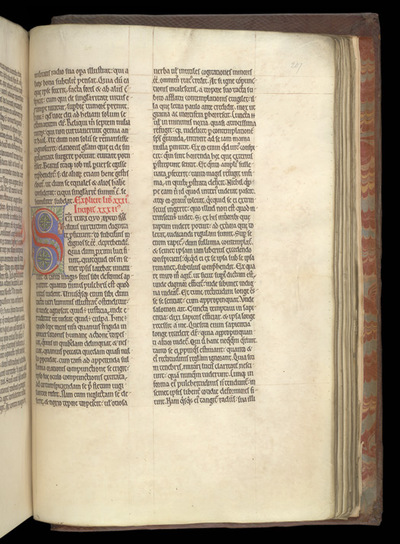Javascript must be enabled to continue!
Decorated Initial, In Gregory The Great's 'Commentary On The Book Of Job' f.207r
View through Europeana Collections
Gregory the Great (c.540-604) was pope (from 590
until his death), reputed inventor of 'Gregorian' chant, and one of
the most important authors of the early Middle Ages. His Commentary
on Job is a vast work, running to half a million words, divided
into 35 books, and is bound in as many as six volumes. This
manuscript contains Books 17-35, and was therefore presumably the
second half of a two-volume set that was apparently owned in the
Middle Ages by St. Mary's Priory, Bradenstoke (between Swindon and
Chippenham). Book XXXIII is introduced by an initial 'S' with
animal heads at each end, and is set against a rich blue
background. The page layout is typical of 12th-century monastic
manuscripts, with two columns of well-spaced text, ample margins,
and none of the apparatus intended to help readers, such as
running-titles, that would become common in the 13th
century.
Title: Decorated Initial, In Gregory The Great's 'Commentary On The
Book Of Job' f.207r
Description:
Gregory the Great (c.
540-604) was pope (from 590
until his death), reputed inventor of 'Gregorian' chant, and one of
the most important authors of the early Middle Ages.
His Commentary
on Job is a vast work, running to half a million words, divided
into 35 books, and is bound in as many as six volumes.
This
manuscript contains Books 17-35, and was therefore presumably the
second half of a two-volume set that was apparently owned in the
Middle Ages by St.
Mary's Priory, Bradenstoke (between Swindon and
Chippenham).
Book XXXIII is introduced by an initial 'S' with
animal heads at each end, and is set against a rich blue
background.
The page layout is typical of 12th-century monastic
manuscripts, with two columns of well-spaced text, ample margins,
and none of the apparatus intended to help readers, such as
running-titles, that would become common in the 13th
century.
Related Results
Tobacco pouch
Tobacco pouch
"362-22" "Two Bears Band, Fort Rice.″Yanktonai pipe bag; wool, glass, porcupine quills; l. 43.5/73 cm., w. 16.5 cm.; ca. 1860s.″Documentation: \Two Bears band, Fort Rice.‖ Purchase...
Ceremonial tobacco pouch
Ceremonial tobacco pouch
Pipe bag; Lakota; ca. 1870-1880 \nHide, glass beads, porcupine quills, pigments; l. 40 cm. (incl. fringe); w. 13 cm.\nRMV 3158-9; purchased from art dealer Leendert Van Lier, Amste...
Booties for mannequin
Booties for mannequin
"(Western?) Apache moccasins for a doll; buckskin, sinew, glass beads; l. (of sole) 5 cm., h. 9 cm., w. 2.5 cm.; ca. 1880.\These beaded miniature high-top moccasins with toe tabs a...
Tobacco pouch
Tobacco pouch
Tobacco, smoking, ritual, pipes, tobacco bags Tobacco was a stimulant used by the indigenous people in large parts of North, Central and South America as a sedative, medicine again...



